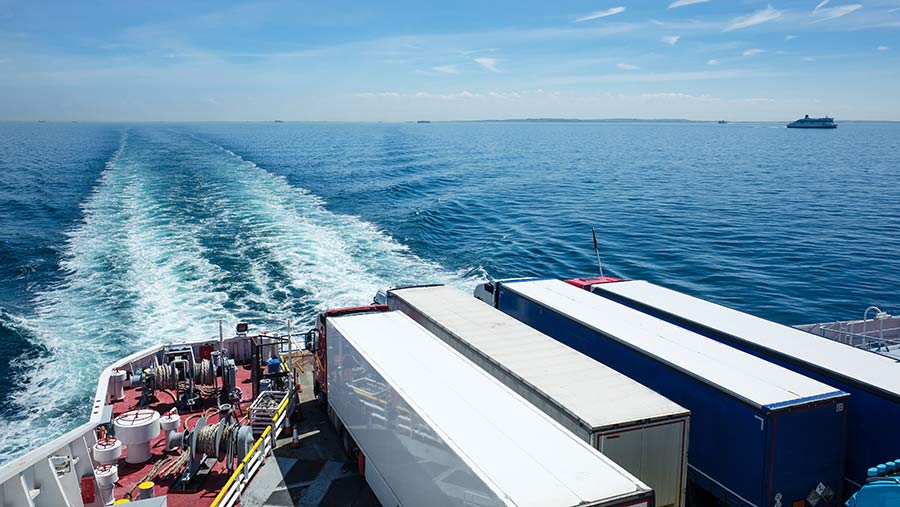Farm leaders attack government on post-Brexit trade failings
 © Tom/Adobe Stock
© Tom/Adobe Stock Farm leaders and politicians have attacked the government over post-Brexit trade issues, two years after the UK officially left the EU.
On Monday 31 January, the government marked the second anniversary since Brexit with a celebratory note.
Prime minister Boris Johnson announced proposals to further extricate Britain from retained EU laws by bringing forward the Brexit Freedoms Bill.
See also: Opinion: Tories are the ‘party of the countryside’ no more
Mr Johnson suggested that this would hasten progress towards gene editing, cleaner air, and more diverse habitats on farmland.
The government also posted its major successes – replacing freedom of movement with a points-based system for immigration, the Covid vaccine rollout and new trade deals with Australia and New Zealand.
Fierce criticism
But claims of progress have sparked a barrage of criticism.
NFU president Minette Batters accused the government of betrayal and using Britain’s food producers as pawns in trade deals.
Mrs Batters told the Observer magazine that the EU was the most prized food market in the world.
But Tory ministers had “handed it over for nothing” in their rush to sign free-trade agreements with Australia and New Zealand, she said.
“I feared farmers would be used as a pawn in trade deals – and that’s effectively what has happened,” Mrs Batters told the Sunday newspaper.
She said there were no long-term safeguards, leaving food producers in fear of a flood of cheap meat, dairy and sugar imports.
And Mrs Batters criticised the government’s combative stance to pleas for a higher number of visas to be allocated to the Seasonal Workers Scheme.
The Home Office has repeatedly rejected NFU calculations which put the number required above 55,000. Instead, it has allocated just 30,000 places.
Scottish trade losses
Stinging criticism has also been levelled at Westminster by the Scottish government.
Scotland’s rural affairs secretary, Mairi Gougeon, said: “Two years on, Brexit has failed to deliver a single benefit for Scottish rural communities, or the countless food and drink businesses that support them.
“Fragile rural and island communities are bearing the brunt of a hard Brexit, recklessly pursued while a global pandemic has ravaged our society and our economy.”
Ms Gougeon added that labour shortages and barriers to trade had already harmed many food businesses with research suggesting a significant risk to their long-term survival.
She cited figures showing that total food and drink exports to the EU had been worth £2.6bn before Brexit but had been hit by the decline in trade.
In 2021, despite a recovery in the market following an initial post-Brexit collapse, exports were still more than 12% down, according to HMRC figures.
That suggested a fall of about £314.6m a year in the food and drink trade since Brexit.
In addition, exporters were being forced to cope with a mountain of complex, time-consuming and costly customs and borders arrangements, Ms Gougeon said.
Red meat trade
British Meat Processors Association policy director Peter Hardwick suggested that extra cost ran into tens of millions of pounds a year.
Export health certificates alone cost almost £60m annually, Mr Hardwick said. And EU importers had said they would not pay for the extra charges, leaving British exporters to foot the bill.
“When you talk to civil servants they will say that the UK has overcome some of the early Brexit problems and they talk in terms of a success.
“But adding huge cost is not a huge success. You can’t call it a success if it costs more to achieve,” Mr Hardwick said.
He also warned that trade deals spelled bad times ahead for the red meat sector.
The government has no understanding of agriculture. Politicians want rewilding and lower subsidies and yet they have opened the door to cheap imports, Mr Hardwick insisted.
“The government says these countries won’t send beef and lamb to us because they have other markets to serve.
“But they are living in a fool’s paradise. If you open the market to cheaper imports, domestic prices will go down,” he said.
Mr Hardwick warned that small- and medium-sized businesses would bear the brunt of the damage.
“[Red meat products] flowing out are as much as 20% down since Brexit and in the long-run these businesses will not cope with losses in trade combined with the huge extra costs,” he said.
“Equivalency with Europe is the answer – the UK red meat sector needs to have a closer trading relationship with its European neighbours in the future.”
